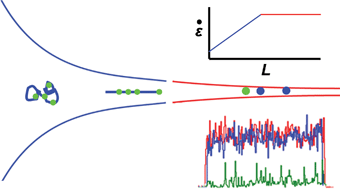This HOT article by Robert Meltzer et al. at Pathogenetix Inc., USA, describes new geometries for the stretching funnel in Genome Sequence Scanning that increase DNA throughput by 30 times.
Genome Sequence Scanning (GSS) detects sequence-specific fluorescent tags on DNA fragments. It is used to identify bacteria by first lysing open the bacteria cell to release the DNA, then using a restriction endonuclease enzyme to digest the DNA into smaller fragments. Fluorescent tags are added that recognise specific repeated elements present in all bacterial genomes. GSS characterises the bacterial genome by the spatial distribution of the tags.
 The detection is done in a continuous flow microfluidic device with confocal microscopy. In order to carry out the spatial recognition of the fluorescent tags along the length of the DNA fragment, it needs to be stretched out into a linear form using a funnel. High molecule throughput is important as the detection confidence of this technology relies on observing as many tags as possible in the specified experimental period.
The detection is done in a continuous flow microfluidic device with confocal microscopy. In order to carry out the spatial recognition of the fluorescent tags along the length of the DNA fragment, it needs to be stretched out into a linear form using a funnel. High molecule throughput is important as the detection confidence of this technology relies on observing as many tags as possible in the specified experimental period.
The team looks at the relationship between the funnel taper shape and related parameters, such as fluid velocity and fragment length, to improve the current designs and increase throughput. Their new geometries are able to keep the tension applied to the DNA constant during the detection process. Because DNA fragments come in various lengths, a very important goal is to maximise the range of lengths that can be stretched effectively with the funnel. The influence of channel etch depth on fluid flow, and therefore throughput, is also considered.
You can learn more about the work of Pathogenetix on Genome Sequence Scanning by visiting their website. This HOT article, which was featured on the cover of Issue 2, is free to access for the next 4 weeks* and you can read it by clicking the link below:
High-throughput genome scanning in constant tension fluidic funnels
Joshua W. Griffis, Ekaterina Protozanova, Douglas B. Cameron and Robert H. Meltzer
DOI: 10.1039/C2LC40943G#
*Free access to individuals is provided through an RSC Publishing personal account. Registration is quick, free and simple
Keep up to date with the latest Lab on a Chip news and blogs by following us on Twitter! @LabonaChip










